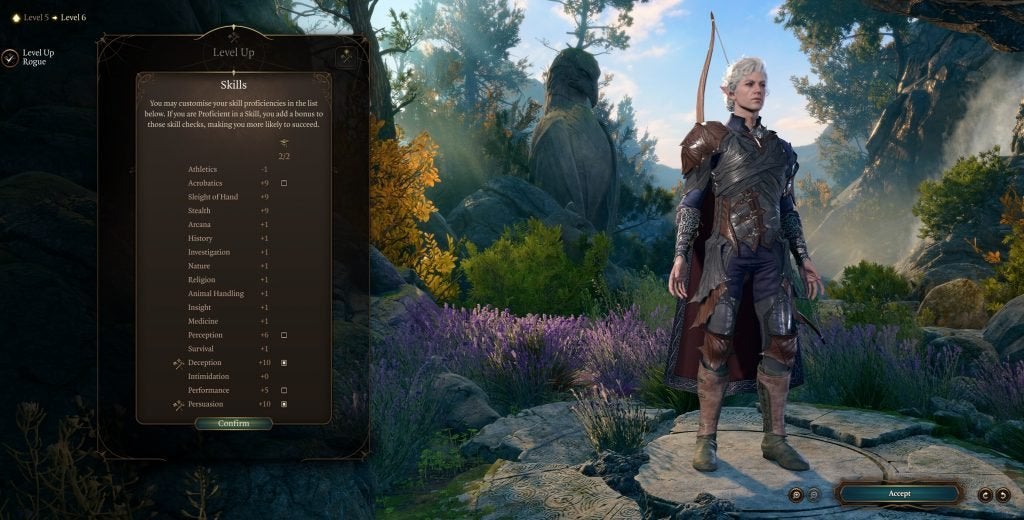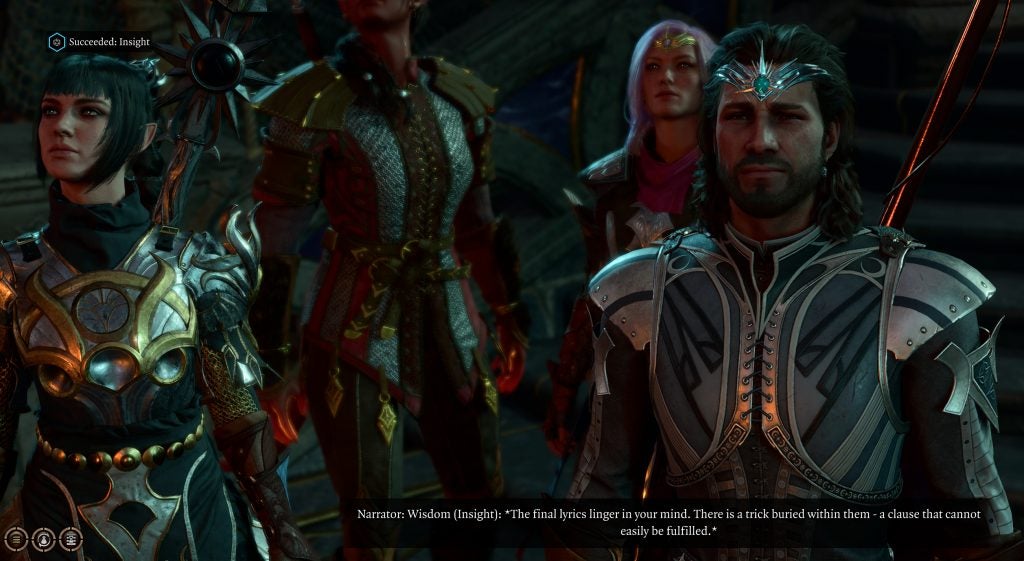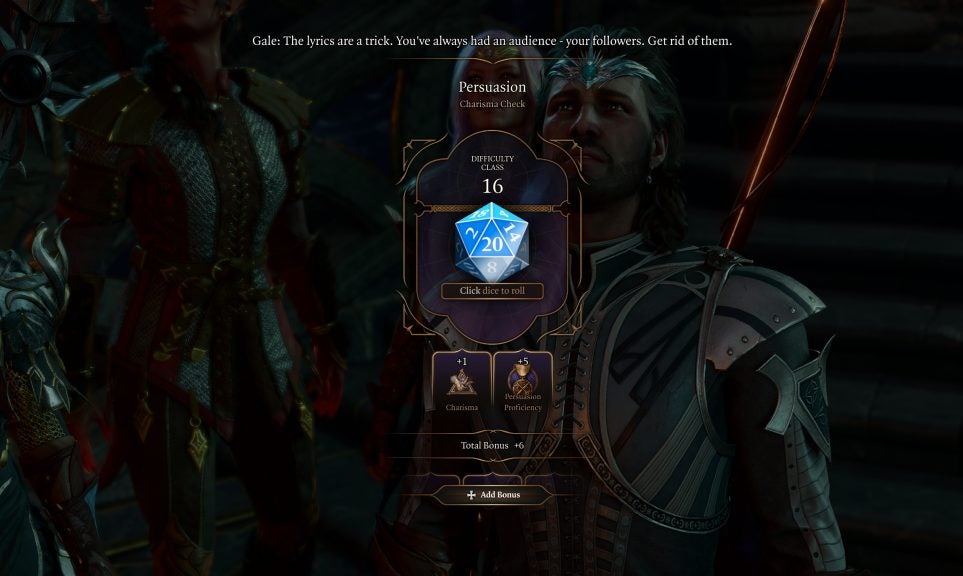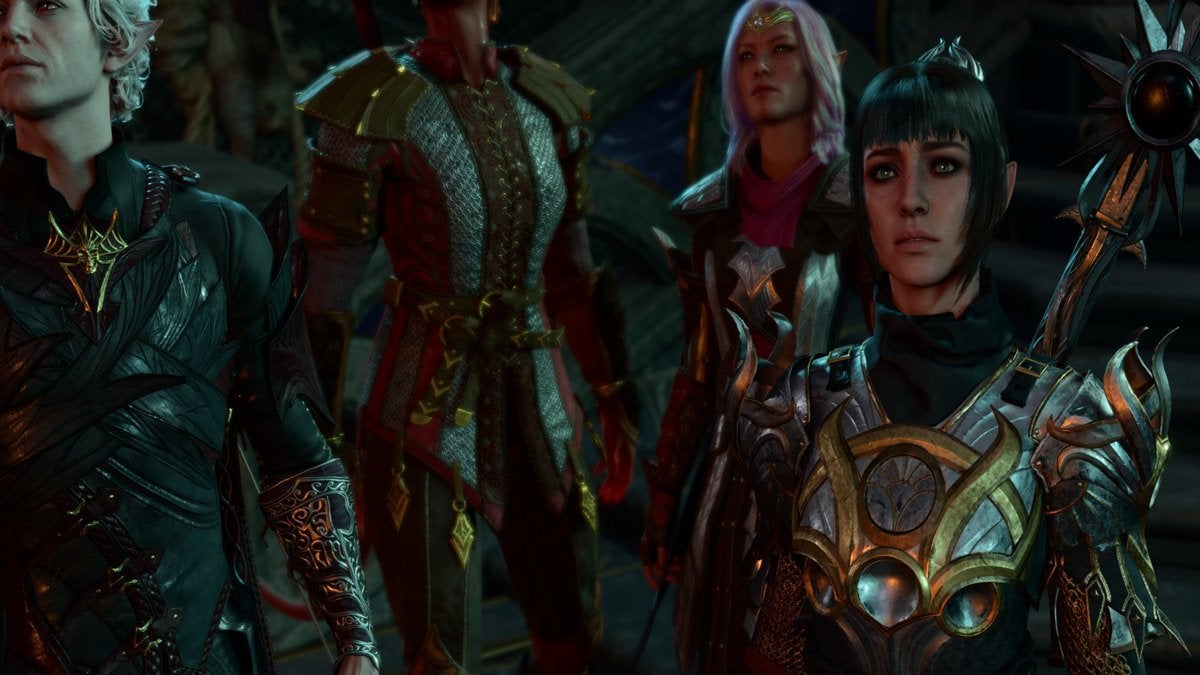![]() Key Takeaway
Key Takeaway
Skills in Baldur’s Gate 3 are passive talents that help determine whether your character will successfully perform a task. Each time you attempt to take an action, a 20-sided die (an icosahedron) is rolled to see if you’re successful.
This role can be positively influenced if you have high Proficiency in the given Skill. There are 18 Skills to choose from, but those available to you depend on your race and class.
With nearly every action requiring a roll of the dice, you’ll need to stack the odds in your favor. To wrap your head around this Dungeons & Dragons-inspired mechanic, you should consult our Skill Proficiency Guide in Baldur’s Gate 3, as we’ve got the best tips for doing so.
Table Of Contents
What Are Skills in Baldur’s Gate 3?
Skills are passive talents that determine whether your character will successfully perform a task. There are 18 total Skills, and each is associated with one of five abilities: Charisma, Dexterity, Intelligence, Strength, or Wisdom. Being proficient at specific Skills can also allow your character to do incredibly useful things, from skipping battle altogether to picking some heavy pockets.
For example, players focusing on the roleplaying aspect of the game can also focus on Skills like History and Religion to flesh out BG3‘s rich story.

How proficient you are in certain Skills depends largely on your character. Your background automatically provides you with two Skills, and you’ll be able to select two more depending on your race and class. For instance, Clerics may choose to focus on Religion, while Rogues often focus on Stealth.
Certain classes can only access certain Skills, but you shouldn’t let that stop you from attempting certain Skill Checks anyway. Luck always plays a factor as well!
About Skill Checks
As you explore, you’ll often need to pass Skill Checks to perform certain actions. This can either be done actively by rolling a 20-sided die, or passively. Passive Skill Checks are done automatically, and you’ll be able to see the result in the upper left-hand corner of your screen.

Active Skill Checks take place when you attempt to select a dialogue option associated with a particular Skill. They also occur when you attempt to disarm a trap or unlock a chest.

Each time a 20-sided die is rolled, the game takes your Skill Proficiency into account. Skill Proficiency is a passive bonus added to your character’s dice rolls that boost your chance of passing the corresponding check.
For example, if you’re playing as a Cleric, you sometimes have the option to call upon your God for a favor. Upon doing so, you’ll need to roll a 20-sided die to see if you’re successful. If your character is Proficient in Religion, you’ll have a bonus value added to the number you roll.
All Skills in Baldur’s Gate 3
Below, we’ve compiled all available Skills in Baldur’s Gate 3. For new players, we’ve also included recommended classes for each Skill and which backgrounds give each a boost.
Charisma Skills
A Charisma Check may trigger when you attempt to entertain, manipulate, or influence someone. Additionally, Bards, Paladins, Sorcerers, and Warlocks use Charisma as their spellcasting ability or to determine if their spells will meet their mark.
| Skill Check | Description | Recommended Classes | Helpful Backgrounds |
|---|---|---|---|
| Deception | Lie and cheat. Manipulate the truth. | Bard, Sorcerer, Warlock | Charlatan, Criminal |
| Intimidation | Be a bully. Threaten and induce fear. | Bard, Sorcerer, Warlock | Soldier |
| Performance | Entertain audiences. Command the stage. | Bard, Sorcerer, Warlock | Entertainer |
| Persuasion | Turn on the charm. Coax and cajole. | All Classes | Guild Artisan, Noble |
Dexterity Skills
Dexterity comes into play when your character attempts to move quickly or quietly. Being proficient in these Skills can also make lockpicking easier, keep you from stumbling when moving across difficult terrain, or make it easier to hide something from an NPC. Your Dexterity also influences how likely you are to land an attack on an enemy.
The higher your Dexterity, the more likely you’ll act first in battle—which can be a major boon against large groups of enemies.
| Skill Check | Description | Recommended Classes | Helpful Backgrounds |
|---|---|---|---|
| Acrobatics | Keep your balance. Land on your feet. | Monk, Ranger, Rogue | Entertainer, Outlander |
| Sleight of Hand | Wield nimble fingers. Steal stuff. | Monk, Ranger, Rogue | Charlatan, Urchin |
| Stealth | Stay out of sight. Melt into the shadows. | Monk, Ranger, Rogue | Criminal, Urchin |
Intelligence Skills
As you interact with many characters of Baldur’s Gate 3, your conversations often revolve around happenings in Faerûn, from History to Religion. It helps to have some familiarity with aspects of the world around you, which is where your Intelligence Skills come in handy. Focusing on some of these Skills can also help you wordlessly communicate with creatures, forge documents, or find hidden objects.
Wizards use Intelligence to determine whether or not their spells will hit.
| Skill Check | Description | Recommended Classes | Helpful Backgrounds |
|---|---|---|---|
| Arcana | Recognize magic. Interact with enchanted items. | Wizard | Sage |
| History | Remember the past—of the world and its people. | Wizard | Noble, Sage |
| Investigation | Analyze clues. Solve mysteries. | Wizard | N/A |
| Nature | Recognize plants and animals. Hug trees. | Wizard | N/A |
| Religion | Recognize deities. Understand holy rites. | Cleric, Paladin, Wizard | Acolyte, Hermit |
Strength Skills
In battle, your Strength determines how likely you are to land a hit and how much damage your Strength-based weapon causes. It also impacts the distance you can jump and the weight you can carry. Strength Checks trigger when you do anything physically demanding, like trying to force open a door, lifting a heavy object, or keeping a boulder from rolling.
| Skill Check | Description | Recommended Classes | Helpful Backgrounds |
|---|---|---|---|
| Athletics | Stay fit. Perform physical stunts. | Barbarian, Paladin | Outlander |
Wisdom Skills
Wisdom Checks trigger when your character needs to show awareness of what’s around them. This could be understanding someone’s feelings, noticing something strange about the environment, or reading body language.
Clerics, Druids, and Rangers use Wisdom to determine whether or not their spells will hit.
| Skill Check | Description | Recommended Classes | Helpful Backgrounds |
|---|---|---|---|
| Animal Handling | Influence animals. Pet all of the dogs. | Cleric, Druid, Monk | Folk Hero |
| Insight | Read people and situations. Detect lies. | Cleric, Druid, Monk | Acolyte, Guild Artisan |
| Medicine | Recognize symptoms. Diagnose disease. | Cleric, Druid, Monk | Hermit |
| Perception | Observe your environment. Spot hidden details. | Cleric, Druid, Monk, Rogue | N/A |
| Survival | Stay alive in the wild. Track prey. | Druid, Monk, Ranger | Folk Hero, Outlander |
Recommended Skills
The Skills you choose to focus on will depend on your character’s class and your play style. This could mean focusing more on battle and defense or leaning more into the story and roleplaying aspects.
Additionally, you’ll need to take into account the Skills your party members are Proficient in to ensure that you’re prepared for anything. Creating an optimized team with complementary Skills can help you take down even the toughest foes.
There are a few Skills that come into play more frequently than others, allowing players to uncover more of the world and interact more meaningfully with the characters of Baldur’s Gate 3.
Both Perception and Insight are highly valuable Skills for players of any class. Perception impacts your awareness of the environment around you, allowing you to uncover secret treasures or predict danger. It also helps you to see through less-trustworthy NPCs, spotting their secrets and true intentions.

As far as social Skills go, Persuasion is a powerful tool. By tapping into your reasoning and logic, you can convince other characters to let you have your way. This can help you avoid pointless battles, get better prices at shops, or foster new relationships and alliances.
In combat, the Athletics Skill can protect you from being knocked back by an enemy or thrown off a ledge to your untimely death. It can also help you to turn these tactics against your enemies.
The lore in Baldur’s Gate 3 is dense, and focusing on Intelligence Skills like History and Religion can help you uncover more of the world’s secrets. You can then use your newfound knowledge to unlock new dialogue trees, solve problems, and impress the characters you meet.
Mastering a diverse set of Skills is vital for maximizing your success in Baldur’s Gate 3. While selecting Skills that complement your party is helpful, choosing ones that are simply interesting to you is never a bad route to take. After all, you can always make different selections the next time around.


